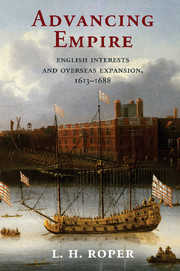Book contents
- Advancing Empire
- Advancing Empire
- Copyright page
- Contents
- Acknowledgments and Note on Sources
- Abbreviations
- Introduction
- 1 Foundations
- 2 The Expansion of English Interests
- 3 The Expansion of English Interests
- 4 The Expansion of English Interests
- 5 Civil War and English Overseas Interests
- 6 New Modelers
- 7 Interregnum, Restoration, and English Overseas Expansion
- 8 Anglo-Dutch Climax
- 9 A New Empire?
- Bibliography
- Index
- References
Bibliography
Published online by Cambridge University Press: 15 July 2017
- Advancing Empire
- Advancing Empire
- Copyright page
- Contents
- Acknowledgments and Note on Sources
- Abbreviations
- Introduction
- 1 Foundations
- 2 The Expansion of English Interests
- 3 The Expansion of English Interests
- 4 The Expansion of English Interests
- 5 Civil War and English Overseas Interests
- 6 New Modelers
- 7 Interregnum, Restoration, and English Overseas Expansion
- 8 Anglo-Dutch Climax
- 9 A New Empire?
- Bibliography
- Index
- References
- Type
- Chapter
- Information
- Advancing EmpireEnglish Interests and Overseas Expansion, 1613–1688, pp. 255 - 280Publisher: Cambridge University PressPrint publication year: 2017



